The Interruption of Political Theology
Lieven Boeve
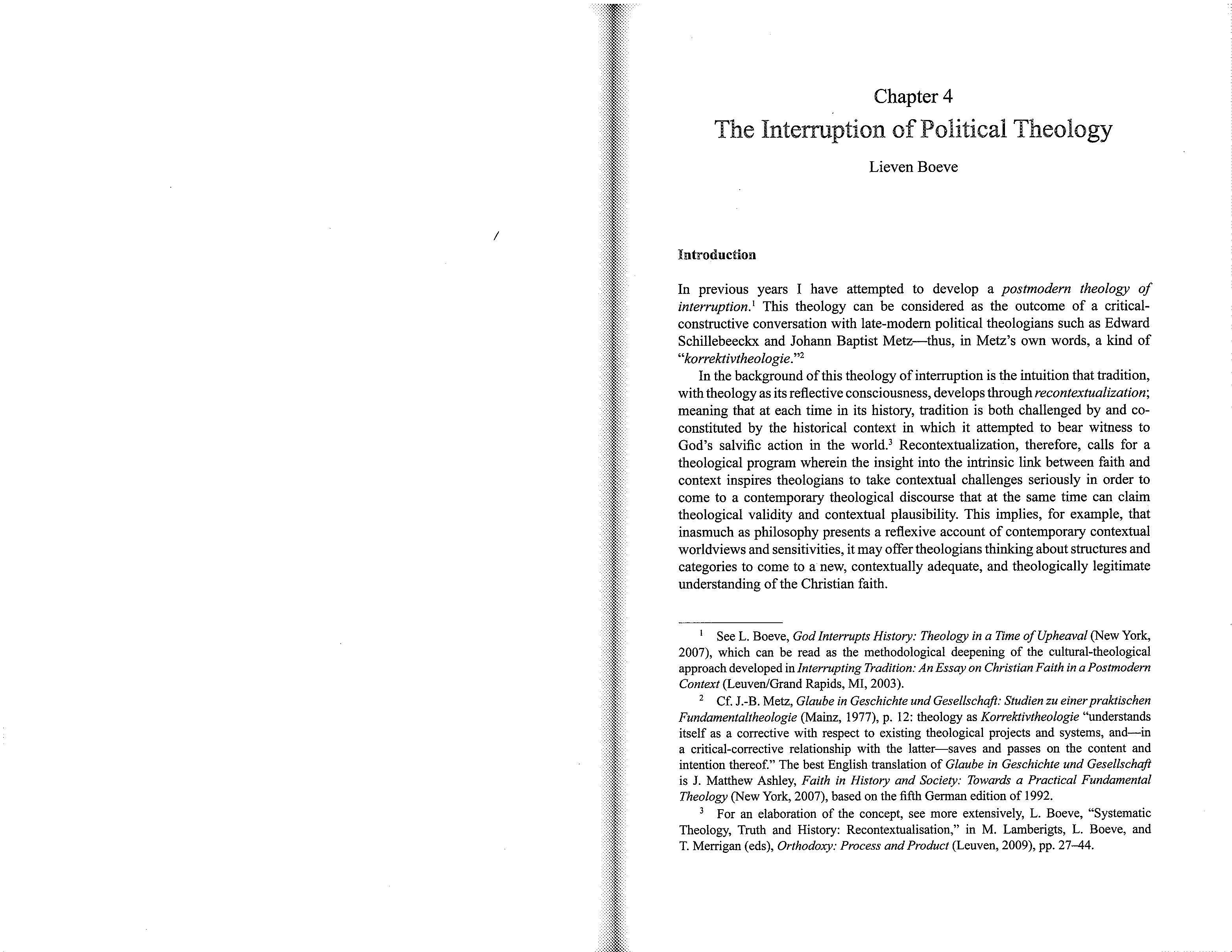
Introduction
In previous years I have attempted to develop a postmodern theology of interruption. I This theology can be considered as the outcome of a criticalconstructive conversation with late-modem political theologians such as Edward Schillebeeckx and Johann Baptist Metz-thus, in Metz's own words, a kind of "korrektivtheologie." 2
In the background of this theology of interruption is the intuition that tradition, with theology as its reflective consciousness, develops through recontextualization; meaning that at each time in its history, tradition is both challenged by and coconstituted by the historical context in which it attempted to bear witness to God's salvific action in the world. 3 Recontextualization, therefore, calls for a theological program wherein the insight into the intrinsic link between faith and context inspires theologians to take contextual challenges seriously in order to come to a contemporary theological discourse that at the same time can claim theological validity and contextual plausibility. This implies, for example, that inasmuch as philosophy presents a reflexive account of contemporary contextual worldviews and sensitivities, it may offer theologians thinking about structures and categories to come to a new, contextually adequate, and theologically legitimate understanding of the Christian faith.
I See L. Boeve, God Interrupts History: Theology in a Time of Upheaval (New York, 2007), which can be read as the methodological deepening of the cultural-theological approach developed in Interrupting Tradition: An Essay on Christian Faith in a Postmodern Context (Leuven!Grand Rapids, MI, 2003).
2 Cf. J.-B. Metz, Glaube in Geschichte und Gesellschaft: Studien zu einer praktischen Fundamentaltheologie (Mainz, 1977), p. 12: theology as Korrektivtheologie "understands itself as a corrective with respect to existing theological projects and systems, and-in a critical-corrective relationship with the latter-saves and passes on the content and intention thereof." The best English translation of Glaube in Geschichte und Gesellschaft is J. Matthew Ashley, Faith in History and Society: Towards a Practical Fundamental Theology (New York, 2007), based on the fifth German edition of 1992.
3 For an elaboration of the concept, see more extensively, L. Boeve, "Systematic Theology, Truth and History: Recontextualisation," in M. Lamberigts, L. Boeve, and T. Merrigan (eds), Orthodoxy: Process and Product (Leuven, 2009), pp. 27-44.
I
Chapter4
In short, my thesis holds that the contextual interruption of Christian theology in Europe leads to a theology of interruption. This contextual interruption of Christianity in Europe occurs through the processes of detraditionalization and pluralization, which has caused Europe's religious panorama to change very rapidly. Christianity hereby has to deal with the fact that it is self-evidently no longer able to hand over its tradition from one generation to the next and, moreover, is confronted with the truth claims of others. This inability t'o transfer tradition and the confrontation with otherness, for all of this, have interrupted theology's selfunderstanding and have made theology more conscious of its own particularity as well as the precarious nature of its own truth claims.
In other words, it has today become theologically inappropriate to think of the Christian faith's relationship both with its past and the present context only in terms of continuity. However, thinking about this double relationship only in terms of discontinuity puts at risk the very notion of "tradition development through recontextualization": tradition's mere discontinuity with its past jeopardizes the notion of tradition itself, just as radical discontinuity with the present context jeopardizes its development. Concerning both relationships, theology is urged to reconsider the precise way in which continuity and discontinuity can be held together in a dynamic-productive tension. It is at this point that the notion of interruption may prove valuable, on both contextual and theological grounds. Interruption, after all, should not be identified with rupture, since what is interrupted does not cease to exist. Yet still, it also implies that what is interrupted does not simply continue as though nothing had happened.
Interruption, in itself, first serves as a concept to express the contextual critical consciousness challenging theology; detraditionalization and pluralization interrupt an all too self-evident Christian identity construction. Conversely, in dialoging with this interruptive critical consciousness, a theology of interruption then attempts to retrieve Christianity's own interruptive nature. Through such recontextualization, interruption not only appears as a contextual category but also serves as a theological category. It structures the way in which we reflect upon the relationship in which God is engaged with God's creation. It is indeed through the encounter with concrete others and otherness that the Christian narrative is challenged and interrupted. An interruption, therefore, has the potential to become the locus in which God is revealed to Christians today, urging them to break open their narratives to bear witness to this divine interruption. 4
It is of course Johann Baptist Metz who was one of the first to define "religion as interruption," and subsequently profiled this notion as one of the core concepts of his political theology. 5 In this chapter, however, I will attempt to show that Metz himself puts the interruptive power of his theology at risk. In line with the main thesis of our theological approach, we will elaborate on how a contextual interruption of Metz s political theology may be able to recontextualize his
4 Cf. Boeve, God Interrupts History, Chapter 2.
5 Cf. see below.
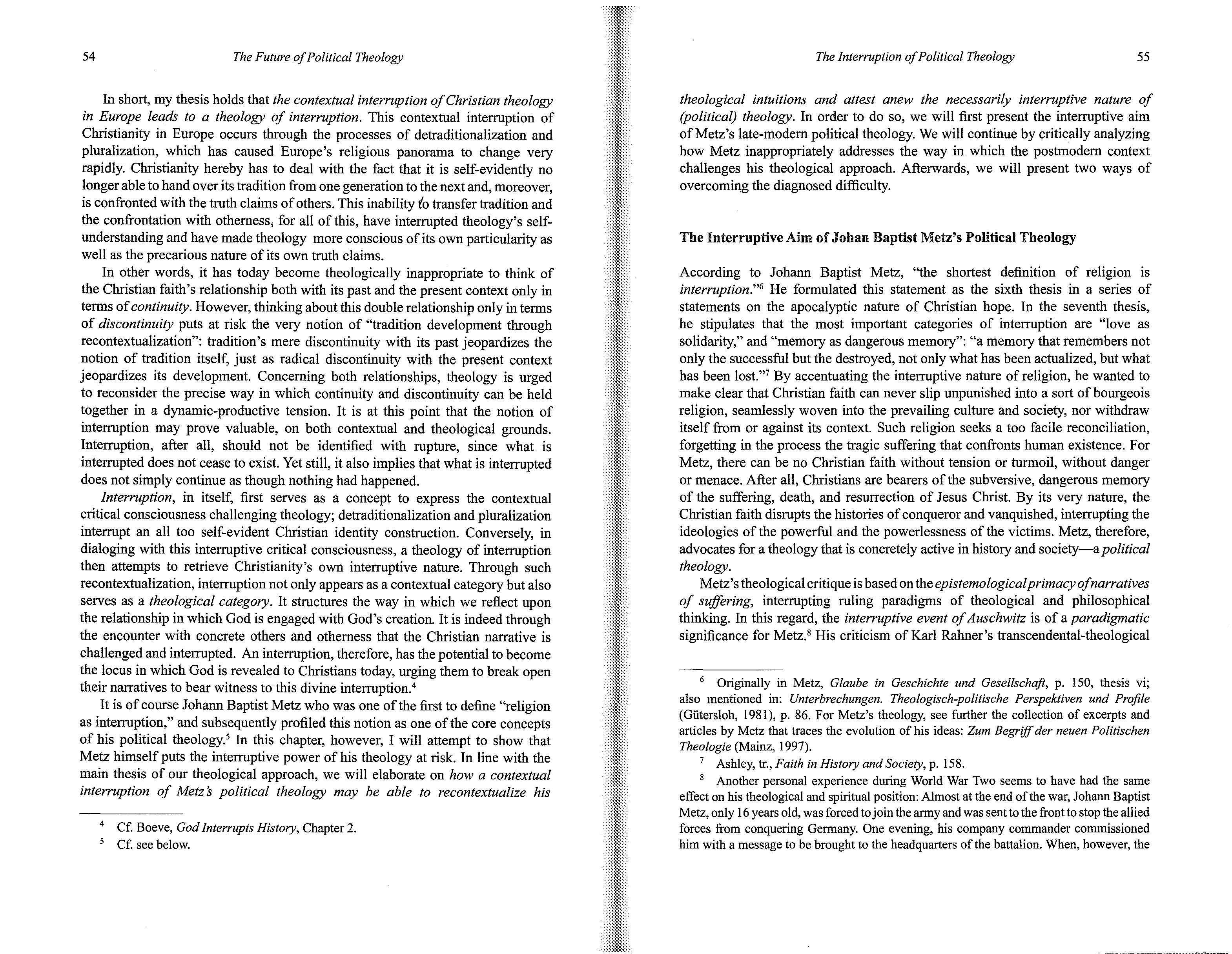
The Interruption of Political Theology 55
theological intuitions and attest anew the necessarily interruptive nature of (political) theology. In order to do so, we will first present the interruptive aim ofMetz's late-modem political theology. We will continue by critically analyzing how Metz inappropriately addresses the way in which the postmodem context challenges his theological approach. Afterwards, we will present two ways of overcomiil,g the diagnosed difficulty.
The Interruptive Aim of Johan Baptist Metz's Political Theology
According to Johann Baptist Metz, "the shortest definition of religion is interruption."6 He formulated this statement as the sixth thesis in a series of statements on the apocalyptic nature of Christian hope. In the seventh thesis, he stipulates that the most important categories of interruption are "love as solidarity," and "memory as dangerous memory": "a memory that remembers not only the successful but the destroyed, not only what has been actualized, but what has been lost."7 By accentuating the interruptive nature of religion, he wanted to make clear that Christian faith can never slip unpunished into a sort of bourgeois religion, seamlessly woven into the prevailing culture and society, nor withdraw itself from or against its context. Such religion seeks a too facile reconciliation, forgetting in the process the tragic suffering that confronts human existence. For Metz, there can be no Christian faith without tension or turmoil, without danger or menace. After all, Christians are bearers of the subversive, dangerous memory of the suffering, death, and resurrection of Jesus Christ. By its very nature, the Christian faith disrupts the histories of conqueror and vanquished, interrupting the ideologies of the powerful and the powerlessness of the victims. Metz, therefore, advocates for a theology that is concretely active in history and society-a political theology.
Metz's theological critique is based on the epistemological primacy ofnarratives of suffering, interrupting ruling paradigms of theological and philosophical thinking. In this regard, the interruptive event of Auschwitz is of a paradigmatic significance for Metz. 8 His criticism of Karl Rahner 's transcendental-theological
6 Originally in Metz, Glaube in Geschichte und Gesellschafl, p. ISO, thesis vi; also mentioned in: Unterbrechungen. Theologisch-politische Perspektiven und Profile (Giitersloh, 1981), p. 86. For Metz's theology, see further the collection of excerpts and articles by Metz that traces the evolution of his ideas: Zum Begriff der neuen Politischen Theologie (Mainz, 1997).
7 Ashley, tr., Faith in History and Society, p. 158.
8 Another personal experience during World War Two seems to have had the same effect on his theological and spiritual position: Almost at the end of the war, Johann Baptist Metz, only 16 years old, was forced to join the army and was sent to the front to stop the allied forces from conquering Germany. One evening, his company commander commissioned him with a message to be brought to the headquarters of the battalion. When, however, the
54 The Future of Political Theology
approach bears indeed on the pivotal question he addresses to his former teacher: "Why haven't we heard you discuss Auschwitz in your lectures? Why is there little or no place at all for the histories of the suffering of people in our theologizing?" 9 It is the same question which fuels Metz's critique of Jiirgen Habermas' communicative approach. After Auschwitz, theology is urged to take a stand against the traditional theological apathy towards concrete suffering and paradigms of reconciliation that comes too easily. Such a theological project therefore critiques religious, philosophical, and theological ways of thinking and living that omit, sublate, or eliminate the political and the historical: transcendental-idealism, Marxism, positivism (with its technological variant), evolutionism, secularism, civil religion, and eurocentrism. Metz reproaches them for their subjectlessness and historylessness, their forgetfulness of suffering and of time.
Political theology, in this regard, should learn from the mistakes made by many modem theologies which, in their engagement with modernity, have taken on its aporias along with its valuable points. 10 Methodologically, Metz intends to arrive at a new hermeneutics of the Jewish-Christian tradition from a criticalproductive discussion with neo-Marxist critical theory, pointing at the dialectics of the Enlightenment found within the works of such thinkers as Walter Benjamin, Theodor Adorno, Ernst Bloch, Herbert Marcuse, and Jiirgen Habermas. For Metz, such a dialog should result in an apologetic-practical fundamental theology: both conscious of its standing within the dialectics of praxis and theory (praxis as the interruption of theory), and able to defend the Christian faith (its plausibility and relevance in particular) against modem systematic thinking. 11 Theologizing in this way can no longer start from system-concepts but should proceed from "subjectconcepts with a practical base": memory, narrative, solidarity. Instead of strong concepts, these notions are weak and fragile, and are mutually interrelated within a dialectics of theory and praxis: "Memory and narrative can no more be practical
following morning Metz returned to his post, he found all his companions dead, nobody had survived the combined air and tank attack of that night. About this experience, he writes: "I remember nothing but a soundless cry ('nichts als einen lautlosen Schrei'). That is the way I still see myself today, and behind this memory all the dreams of my childhood have fallen away Up until today my prayers are fulfilled with this soundless cry. And my theological work is-and the older I become, the more insistent--characterised by a special sensibility for the so-called theodicy question, for the question for God in light of the unfathomable history of suffering of the world, which though should be 'his' world": J.B. Metz, Memoria Passionis. Ein Provozierendes Gedachtnis in pluralistischer Gesellschaft (Freiburg, 2006), p. 94, with gratitude to Dr. Lea Verstricht for this reference.
9 Cf. Welches Christentum hat Zukurift? Dorothee Salle und Johann Baptist Metz im Gesprach mit Karl-Joseph Kuschel (Stuttgart, 1990), p. 23.
10 Metz severely criticizes modernity's identification of emancipation with the liberation of the self. The promises that evoke such a concept of "emancipation" simply cannot be fulfilled; the human history of liberation has resulted in enormous contradictions. Cf. Metz, Glaube in Geschichte und Gesellschaft, pp. 114-27.
11 Ibid., pp. 25 ff.
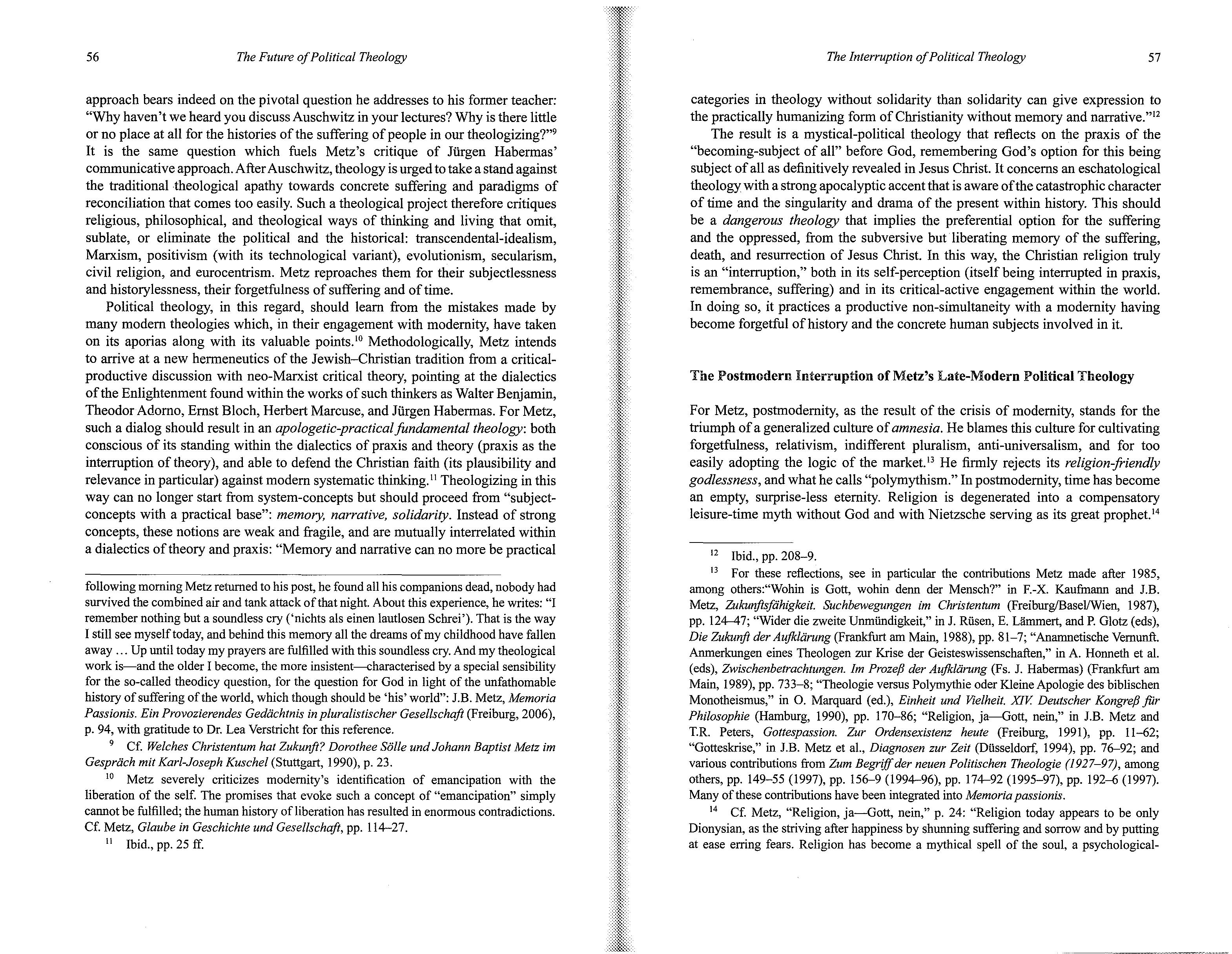
categories in theology without solidarity than solidarity can give expression to the practically humanizing form of Christianity without memory and narrative." 12
The result is a mystical-political theology that reflects on the praxis of the "becoming-subject of all" before God, remembering God's option for this being subject of all as definitively revealed in Jesus Christ. It concerns an eschatological theology with a strong apocalyptic accent that is aware of the catastrophic character of time and the singularity and drama of the present within history. This should be a dangerous theology that implies the preferential option for the suffering and the oppressed, from the subversive but liberating memory of the suffering, death, and resurrection of Jesus Christ. In this way, the Christian religion truly is an "interruption," both in its self-perception (itself being interrupted in praxis, remembrance, suffering) and in its critical-active engagement within the world. In doing so, it practices a productive non-simultaneity with a modernity having become forgetful of history and the concrete human subjects involved in it.
The Postmodern Interruption of Metz's Late-Modern Political Theology
For Metz, postrnodemity, as the result of the crisis of modernity, stands for the triumph of a generalized culture of amnesia. He blames this culture for cultivating forgetfulness, relativism, indifferent pluralism, anti-universalism, and for too easily adopting the logic of the market. 13 He firmly rejects its religion-friendly godlessness, and what he calls "polymythism." In postrnodemity, time has become an empty, surprise-less eternity. Religion is degenerated into a compensatory leisure-time myth without God and with Nietzsche serving as its great prophet. 14
12 Ibid., pp. 208-9.
13 For these reflections, see in particular the contributions Metz made after 1985, among others:"Wohin is Gott, wohin denn der Mensch?" in F.-X. Kaufinann and J.B. Metz, Zukunftsfahigkeit. Suchbewegungen im Christentum (Freiburg!Basel!Wien, 1987), pp. 124-47; "Wider die zweite Unmtindigkeit," in J. Rtisen, E. Lammert, and P. Glotz (eds), Die Zukunft der Aujklarung (Frankfurt am Main, 1988), pp. 81-7; "Ananmetische Vernunft. Anmerkungen eines Theologen zur Krise der Geisteswissenschaften," in A. Honneth et a!. (eds), Zwischenbetrachtungen. Im ProzefJ der Aujklarung (Fs. J. Habermas) (Frankfurt am Main, 1989), pp. 733-8; "Theologie versus Polymythie oder Kleine Apologie des biblischen Monotheismus," in 0. Marquard (ed.), Einheit und Vielheit. XIV. Deutscher KongrefJ for Philosophie (Hamburg, 1990), pp. 170-86; "Religion, ja-Gott, nein," in J.B. Metz and T.R. Peters, Gottespassion. Zur Ordensexistenz heute (Freiburg, 1991), pp. 11-62; "Gotteskrise," in J.B. Metz eta!., Diagnosen zur Zeit (DUsseldorf, 1994), pp. 76-92; and various contributions from Zum Begriff der neuen Politischen Theologie (1927-97), among others, pp. 149-55 (1997), pp. 156-9 (1994-96), pp. 174-92 (1995-97), pp. 192-6 (1997). Many of these contributions have been integrated into Memoria passionis.
14 Cf. Metz, "Religion, ja-Gott, nein," p. 24: "Religion today appears to be only Dionysian, as the striving after happiness by shurming suffering and sorrow and by putting at ease erring fears. Religion has become a mythical spell of the soul, a psychological-
56 The Future of Political Theology
The Interruption of Political Theology 57
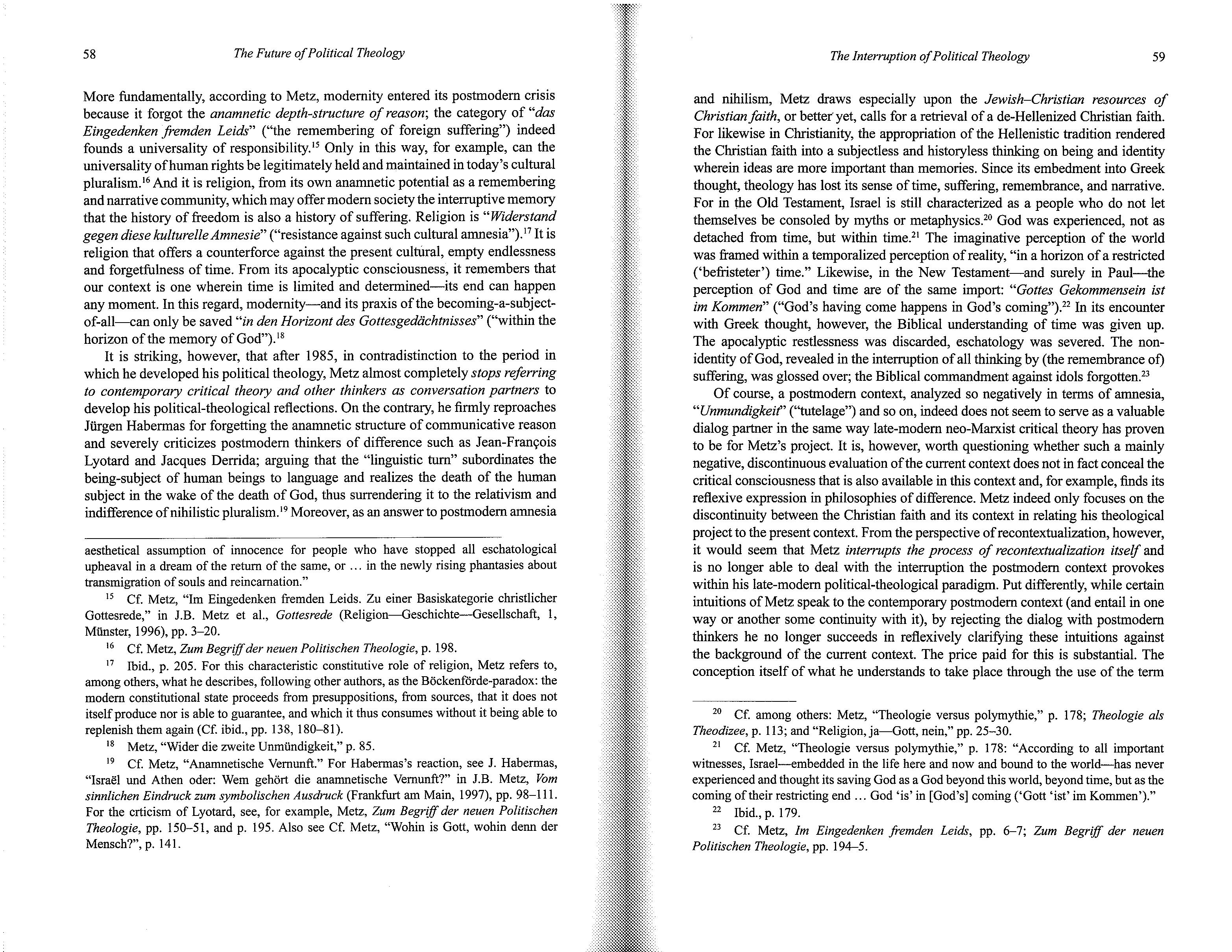
More fundamentally, according to Metz, modernity entered its postmodem crisis because it forgot the anamnetic depth-structure of reason; the category of "das Eingedenken fremden Leids" ("the remembering of foreign suffering") indeed founds a universality of responsibility. 15 Only in this way, for example, can the universality ofhuman rights be legitimately held and maintained in today's cultural pluralism. 16 And it is religion, from its own anamnetic potential as a remembering and narrative community, which may offer modem society the interruptive memory that the history of freedom is also a history of suffering. Religion is "Widerstand gegen diese kulturelle Amnesie" ("resistance against such cultural amnesia"). 17 It is religion that offers a counterforce against the present cultUral, empty endlessness and forgetfulness of time. From its apocalyptic consciousness, it remembers that our context is one wherein time is limited and determined-its end can happen any moment. In this regard, modernity-and its praxis of the becoming-a-subjectof-all-can only be saved "in den Horizont des Gottesgediichtnisses" ("within the horizon of the memory ofGod")Y
It is striking, however, that after 1985, in contradistinction to the period in which he developed his political theology, Metz almost completely stops referring to contemporary critical theory and other thinkers as conversation partners to develop his political-theological reflections. On the contrary, he firmly reproaches Jiirgen Habermas for forgetting the anamnetic structure of communicative reason and severely criticizes postmodem thinkers of difference such as Jean-Fran9ois Lyotard and Jacques Derrida; arguing that the "linguistic turn" subordinates the being-subject of human beings to language and realizes the death of the human subject in the wake of the death of God, thus surrendering it to the relativism and indifference of nihilistic pluralism. 19 Moreover, as an answer to postrnodem amnesia
aesthetical assumption of innocence for people who have stopped all eschatological upheaval in a dream of the return of the same, or ... in the newly rising phantasies about transmigration of souls and reincarnation."
15 Cf. Metz, "Im Eingedenken fremden Leids. Zu einer Basiskategorie christlicher Gottesrede," in J.B. Metz et a!., Gottesrede (Religion-Geschichte-Gesellschaft, I, Miinster, 1996), pp. 3-20.
16 Cf. Metz, Zum Begriff der neuen Politischen Theologie, p. 198.
17 Ibid., p. 205. For this characteristic constitutive role of religion, Metz refers to, among others, what he describes, following other authors, as the Bockenf<irde-paradox: the modem constitutional state proceeds from presuppositions, from sources, that it does not itself produce nor is able to guarantee, and which it thus consumes without it being able to replenish them again (Cf. ibid., pp. 138, 180-81).
18 Metz, "Wider die zweite Unmiindigkeit," p. 85.
19 Cf. Metz, "Anamnetische Vemunft." For Habermas's reaction, see J. Habermas, "Israel und Athen oder: Wem gehort die anamnetische Vemunft?" in J.B. Metz, Vom sinnlichen Eindruck zum symbolischen Ausdruck (Frankfurt am Main, 1997), pp. 98-111. For the crticism of Lyotard, see, for example, Metz, Zum Begriff der neuen Politischen Theologie, pp. 150-51, and p. 195. Also see Cf. Metz, "Wohin is Gott, wohin denn der Mensch?", p. 141.
and nihilism, Metz draws especially upon the Jewish-Christian resources of Christian faith, or better" yet, calls for a retrieval of a de-Hellenized Christian faith. For likewise in Christianity, the appropriation of the Hellenistic tradition rendered the Christian faith into a subjectless and historyless thinking on being and identity wherein ideas are more important than memories. Since its embedment into Greek thought, theology has lost its sense of time, suffering, remembrance, and narrative. For in the Old Testament, Israel is still characterized as a people who do not let themselves be consoled by myths or metaphysics. 20 God was experienced, not as detached from time, but within timeY The imaginative perception of the world was framed within a temporalized perception of reality, "in a horizon of a restricted ('befristeter') time." Likewise, in the New Testament-and surely in Paul-the perception of God and time are of the same import: "Gottes Gekommensein ist im Kommen" ("God's having come happens in God's coming"). 22 In its encounter with Greek thought, however, the Biblical understanding of time was given up. The apocalyptic restlessness was discarded, eschatology was severed. The nonidentity of God, revealed in the interruption of all thinking by (the remembrance of) suffering, was glossed over; the Biblical commandment against idols forgotten. 23
Of course, a postrnodem context, analyzed so negatively in terms of amnesia, "Unmundigkeif' ("tutelage") and so on, indeed does not seem to serve as a valuable dialog partner in the same way late-modem neo-Marxist critical theory has proven to be for Metz's project. It is, however, worth questioning whether such a mainly negative, discontinuous evaluation of the current context does not in fact conceal the critical consciousness that is also available in this context and, for example, finds its reflexive expression in philosophies of difference. Metz indeed only focuses on the discontinuity between the Christian faith and its context in relating his theological project to the present context. From the perspective of recontextualization, however, it would seem that Metz interrupts the process of recontextualization itself and is no longer able to deal with the interruption the postrnodem context provokes within his late-modem political-theological paradigm. Put differently, while certain intuitions ofMetz speak to the contemporary postrnodem context (and entail in one way or another some continuity with it), by rejecting the dialog with postrnodem thinkers he no longer succeeds in reflexively clarifying these intuitions against the background of the current context. The price paid for this is substantial. The conception itself of what he understands to take place through the use of the term
2° Cf. among others: Metz, "Theologie versus polymythie," p. 178; Theologie als Theodizee, p. 113; and "Religion, ja-Gott, nein," pp. 25-30.
21 Cf. Metz, "Theologie versus polymythie," p. 178: "According to all important witnesses, Israel-embedded in the life here and now and bound to the world-has never experienced and thought its saving God as a God beyond this world, beyond time, but as the coming of their restricting end God 'is' in [God's] coming ('Gott 'ist' im Kommen')."
22 Ibid., p. 179.
23 Cf. Metz, Jm Eingedenken fremden Leids, pp. 6-7; Zum Begriff der neuen Politischen Theologie, pp. 194-5.
58 The Future of Political Theology
of Political Theology 59
The Interruption
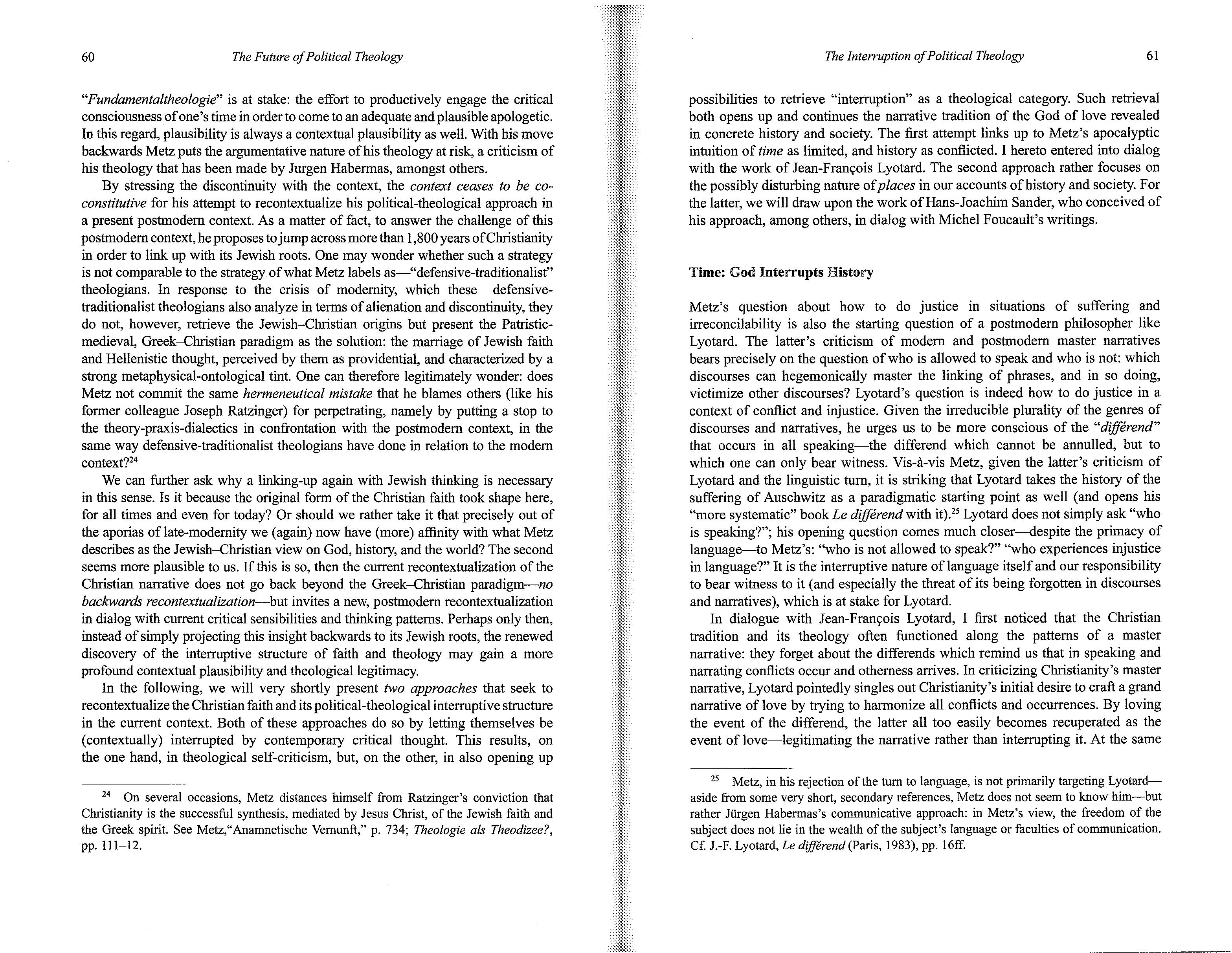
"Fundamentaltheologie" is at stake: the effort to productively engage the critical consciousness of one's time in order to come to an adequate and plausible apologetic. In this regard, plausibility is always a contextual plausibility as well. With his move backwards Metz puts the argumentative nature of his theology at risk, a criticism of his theology that has been made by Jurgen Habermas, amongst others.
By stressing the discontinuity with the context, the context ceases to be coconstitutive for his attempt to recontextualize his political-theological approach in a present postrnodem context. As a matter of fact, to answer the challenge of this postrnodem context, he proposes to jump across more than 1,800 years of Christianity in order to link up with its Jewish roots. One may wonder whether such a strategy is not comparable to the strategy of what Metz labels as-" defensive-traditionalist" theologians. In response to the crisis of modernity, which these defensivetraditionalist theologians also analyze in terms of alienation and discontinuity, they do not, however, retrieve the Jewish-Christian origins but present the Patristicmedieval, Greek-Christian paradigm as the solution: the marriage of Jewish faith and Hellenistic thought, perceived by them as providential, and characterized by a strong metaphysical-ontological tint. One can therefore legitimately wonder: does Metz not commit the same hermeneutical mistake that he blames others (like his former colleague Joseph Ratzinger) for perpetrating, namely by putting a stop to the theory-praxis-dialectics in confrontation with the postrnodem context, in the same way defensive-traditionalist theologians have done in relation to the modem context?24
We can further ask why a linking-up again with Jewish thinking is necessary in this sense. Is it because the original form of the Christian faith took shape here, for all times and even for today? Or should we rather take it that precisely out of the aporias of late-modernity we (again) now have (more) affinity with what Metz describes as the Jewish-Christian view on God, history, and the world? The second seems more plausible to us. If this is so, then the current recontextualization of the Christian narrative does not go back beyond the Greek-Christian paradigm-no backwards recontextualization-but invites a new, postrnodem recontextualization in dialog with current critical sensibilities and thinking patterns. Perhaps only then, instead of simply projecting this insight backwards to its Jewish roots, the renewed discovery of the interruptive structure of faith and theology may gain a more profound contextual plausibility and theological legitimacy.
In the following, we will very shortly present two approaches that seek to recontextualize the Christian faith and its political-theological interruptive structure in the current context. Both of these approaches do so by letting themselves be (contextually) interrupted by contemporary critical thought. This results, on the one hand, in theological self-criticism, but, on the other, in also opening up
24 On several occasions, Metz distances himself from Ratzinger 's conviction that Christianity is the successful synthesis, mediated by Jesus Christ, of the Jewish faith and the Greek spirit. See Metz,"Anamnetische Vemunft," p. 734; Theologie als Theodizee?, pp. 111-12.
The Interruption of Political Theology
possibilities to retrieve "interruption" as a theological category. Such retrieval both opens up and continues the narrative tradition of the God of love revealed in concrete history and society. The first attempt links up to Metz's apocalyptic intuition of time as limited, and history as conflicted. I hereto entered into dialog with the work of Jean-Fran9ois Lyotard. The second approach rather focuses on the possibly disturbing nature of places in our accounts of history and society. For the latter, we will draw upon the work ofHans-Joachim Sander, who conceived of his approach, among others, in dialog with Michel Foucault's writings.
Time: God Interrupts History
Metz's question about how to do justice in situations of suffering and irreconcilability is also the starting question of a postrnodem philosopher like Lyotard. The latter's criticism of modem and postrnodem master narratives bears precisely on the question of who is allowed to speak and who is not: which discourses can hegemonically master the linking of phrases, and in so doing, victimize other discourses? Lyotard's question is indeed how to do justice in a context of conflict and injustice. Given the irreducible plurality of the genres of discourses and narratives, he urges us to be more conscious of the "dif(erend" that occurs in all speaking-the differend which cannot be annulled, but to which one can only bear witness. Vis-a-vis Metz, given the latter's criticism of Lyotard and the linguistic tum, it is striking that Lyotard takes the history of the suffering of Auschwitz as a paradigmatic starting point as well (and opens his "more systematic" book Le dif(erend with it).ZS Lyotard does not simply ask "who is speaking?"; his opening question comes much closer-despite the primacy of language-to Metz's: "who is not allowed to speak?" "who experiences injustice in language?" It is the interruptive nature of language itself and our responsibility to bear witness to it (and especially the threat of its being forgotten in discourses and narratives), which is at stake for Lyotard.
In dialogue with Jean-Fran9ois Lyotard, I first noticed that the Christian tradition and its theology often functioned along the patterns of a master narrative: they forget about the differends which remind us that in speaking and narrating conflicts occur and otherness arrives. In criticizing Christianity's master narrative, Lyotard pointedly singles out Christianity's initial desire to craft a grand narrative of love by trying to harmonize all conflicts and occurrences. By loving the event of the differend, the latter all too easily becomes recuperated as the event of love-legitimating the narrative rather than interrupting it. At the same
25 Metz, in his rejection of the tum to language, is not primarily targeting Lyotardaside from some very short, secondary references, Metz does not seem to know him-but rather Jiirgen Habermas's communicative approach: in Metz's view, the freedom of the subject does not lie in the wealth of the subject's language or faculties of communication.
Cf. J.-F. Lyotard, Le d!ffi!rend (Paris, 1983), pp. 16ff.
60 The Future of Political Theology
61
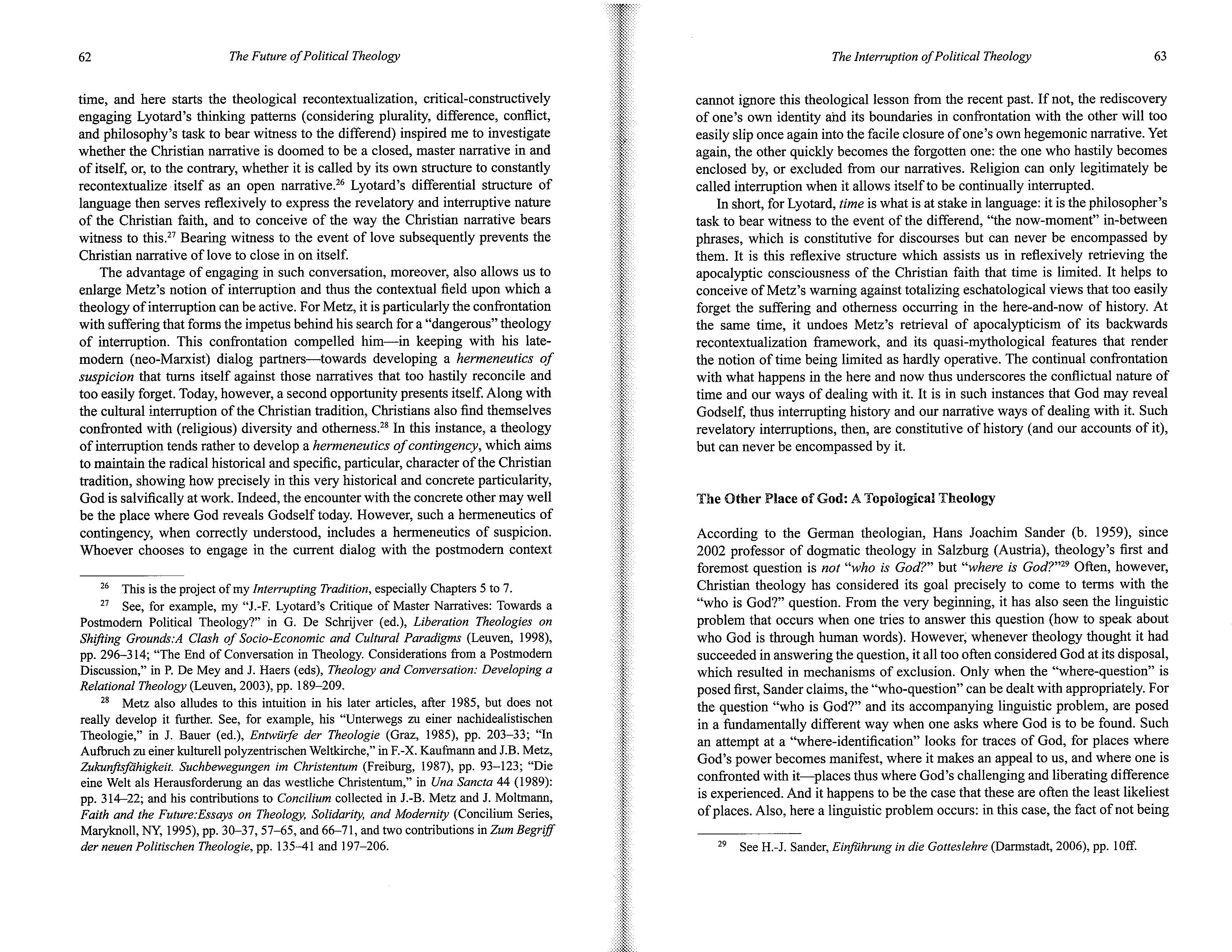
time, and here starts the theological recontextualization, critical-constructively engaging Lyotard's thinking patterns (considering plurality, difference, conflict, and philosophy's task to bear witness to the differend) inspired me to investigate whether the Christian narrative is doomed to be a closed, master narrative in and of itself, or, to the contrary, whether it is called by its own structure to constantly recontextualize itself as an open narrative. 26 Lyotard's differential structure of language then serves reflexively to express the revelatory and interruptive nature of the Christian faith, and to conceive of the way the Christian narrative bears witness to this. 27 Bearing witness to the event of love subsequently prevents the Christian narrative of love to close in on itself.
The advantage of engaging in such conversation, moreover, also allows us to enlarge Metz's notion of interruption and thus the contextual field upon which a theology of interruption can be active. For Metz, it is particularly the confrontation with suffering that forms the impetus behind his search for a "dangerous" theology of interruption. This confrontation compelled him-in keeping with his latemodem (neo-Marxist) dialog partners-towards developing a hermeneutics of suspicion that turns itself against those narratives that too hastily reconcile and too easily forget. Today, however, a second opportunity presents itself. Along with the cultural interruption of the Christian tradition, Christians also find themselves confronted with (religious) diversity and othemess. 28 In this instance, a theology of interruption tends rather to develop a hermeneutics of contingency, which aims to maintain the radical historical and specific, particular, character of the Christian tradition, showing how precisely in this very historical and concrete particularity, God is salvifically at work. Indeed, the encounter with the concrete other may well be the place where God reveals Godself today. However, such a hermeneutics of contingency, when correctly understood, includes a hermeneutics of suspicion. Whoever chooses to engage in the current dialog with the postmodem context
26 This is the project of my Interrupting Tradition, especially Chapters 5 to 7.
27 See, for example, my "J.-F. Lyotard's Critique of Master Narratives: Towards a Postmodern Political Theology?" in G. De Schrijver (ed.), Liberation Theologies on Shifting Grounds:A Clash of Socio-Economic and Cultural Paradigms (Leuven, 1998), pp. 296-314; "The End of Conversation in Theology. Considerations from a Postmodern Discussion," in P. De Mey and J. Haers (eds), Theology and Conversation: Developing a Relational Theology (Leuven, 2003), pp. 189-209.
28 Metz also alludes to this intuition in his later articles, after 1985, but does not really develop it further. See, for example, his "Unterwegs zu einer nachidealistischen Theo1ogie," in J. Bauer (ed.), Entwiirfe der Theologie (Graz, 1985), pp. 203-33; "In Aufbruch zu einer kulturell polyzentrischen Weltkirche," in F.-X. Kaufinann and J.B. Metz, Zukunftsfiihigkeit. Suchbewegungen im Christentum (Freiburg, 1987), pp. 93-123; "Die eine Welt als Herausforderung an das westliche Christentum," in Una Sancta 44 (1989): pp. 314-22; and his contributions to Concilium collected in J.-B. Metz and J. Moltmann, Faith and the Future: Essays on Theology. Solidarity, and Modernity (Concilium Series, Maryknoll, NY, 1995), pp. 30-37,57-65, and 66-71, and two contributions in Zum Begrif.f der neuen Politischen Theologie, pp. 135-41 and 197-206.
The Interruption of Political Theology
cannot ignore this theological lesson from the recent past. If not, the rediscovery of one's own identity ahd its boundaries in confrontation with the other will too easily slip once again into the facile closure of one's own hegemonic narrative. Yet again, the other quickly becomes the forgotten one: the one who hastily becomes enclosed by, or excluded from our narratives. Religion can only legitimately be called interruption when it allows itself to be continually interrupted.
In short, for Lyotard, time is what is at stake in language: it is the philosopher's task to bear witness to the event of the differend, "the now-moment" in-between phrases, which is constitutive for discourses but can never be encompassed by them. It is this reflexive structure which assists us in reflexively retrieving the apocalyptic consciousness of the Christian faith that time is limited. It helps to conceive ofMetz's warning against totalizing eschatological views that too easily forget the suffering and otherness occurring in the here-and-now of history. At the same time, it undoes Metz's retrieval of apocalypticism of its backwards recontextualization framework, and its quasi-mythological features that render the notion of time being limited as hardly operative. The continual confrontation with what happens in the here and now thus underscores the conflictual nature of time and our ways of dealing with it. It is in such instances that God may reveal Godself, thus interrupting history and our narrative ways of dealing with it. Such revelatory interruptions, then, are constitutive of history (and our accounts of it), but can never be encompassed by it.
The Other Place of God: A Topological Theology
According to the German theologian, Hans Joachim Sander (b. 1959), since 2002 professor of dogmatic theology in Salzburg (Austria), theology's first and foremost question is not "who is God?" but "where is God?" 29 Often, however, Christian theology has considered its goal precisely to come to terms with the "who is God?" question. From the very beginning, it has also seen the linguistic problem that occurs when one tries to answer this question (how to speak about who God is through human words). However; whenever theology thought it had succeeded in answering the question, it all too often considered God at its disposal, which resulted in mechanisms of exclusion. Only when the "where-question" is posed first, Sander claims, the "who-question" can be dealt with appropriately. For the question "who is God?" and its accompanying linguistic problem, are posed in a fundamentally different way when one asks where God is to be found. Such an attempt at a "where-identification" looks for traces of God, for places where God's power becomes manifest, where it makes an appeal to us, and where one is confronted with it-places thus where God's challenging and liberating difference is experienced. And it happens to be the case that these are often the least likeliest of places. Also, here a linguistic problem occurs: in this case, the fact of not being
29 See H.-J. Sander, Einfilhrung in die Gotteslehre (Darmstadt, 2006), pp. !Off.
62 The Future of Political Theology
63
able to speak about God is not a metaphysical-epistemological problem but an experiential and topological one. God is to be encountered in places other than those where we expect God to be, where we may lay claim on God. It is from such "other places" that we then can learn about "who" God is, and that we can speak from God. It is also from such heterotopoi that the mechanisms of exclusion accompanying "who-identifications" become apparent.
It is the work of Michel Foucault that has inspired Sander to develop such a topological theology, utilizing his work as a contemporary critical theory to recontextualize theology's critical potentiaJ.3° Through a genealogical analysis of power, Foucault did not first enquire who possesses power, but how power functions and which mechanisms of inclusion and exclusion it produces. Therefore, it is important to be attentive to that which is not said in a given discourse but nevertheless is constitutive of it-that which cannot be framed by the discourse-, and thus has to remain speechless. A genealogical analysis of discourses of power may reveal how and which mechanisms of exclusion are at work in a given discourse. For Sander as well, this question of power can only be answered when one suspends the "who-question" and engages with "where-questions." Places are full of power, both for who belongs to a place and for who is (kept) outside of it: "Already the differentiation between the inside and outside of a place is an event which constitutes power." 31 It is at this point that Sander retrieves the distinction made by Foucault between utopias and heterotopias: between "not-places" and "other-places." As a not-place, a utopia offers a fundamentally different vision of the world, an alternative world against the current world. A heterotopia, on the contrary, is a place in this world, from which the current state of affairsthe ruling discourses of power-are looked at differently. From such otherplaces, mechanisms of exclusion become disclosed, and counter-discourses with potentially real counter-power may emerge from it, thereby giving voice to what previously had to remain silent within the current state of affairs.
For Sander, a new possibility for speaking about/of God arises within the interplay between power (what can be said) and powerlessness (what cannot be said): parsing a discourse through this framework brings to light what is present and what is absent (because it is excluded from it) by changing places of power and through seeing how power relations shift when seen from other perspectives. Theology is therefore topologically determined. In reference to Melchior Carro's reflections of loci theologici, Sander considers heterotopia to be a locus theologicus alienus: places in history to speak from God's liberating power (in contradistinction to the loci theologici proprii as Scripture, tradition, and magisterium). 32 It is not from theological utopias-such as apocalyptic visions of a massive intervention of God, or eschatological dreams of ultimate reconciliation-but from the silent
3° For this paragraph, see Sander, Einfohrung, pp. 3lff.
31 Ibid., p. 33.
32 Cf. M. Cano, De locis theologicis [1563], referred to in Sander, Einfohrung, pp. 40 and 166.
other place of the cross, from the speechlessness of the concrete victim of violence, that power arises to speak of God. But how? By letting the speechlessness speak about God. For all speech of God in relation to history is crossed out by the speechlessness of the victims ofhistory: 33
This is the specific place of mystic in Godtalk. It runs the risk to become mute about God. And in the confrontation with the victims of history, this risk becomes its particular way of speaking. This ensures the authority of the locus theologicus of history for theology, when it, confronted with the fate of the victim, remains speechless and confesses this speechlessness in speech. 34
This speechlessness is therefore the way to approach the presence of God in history; it is only the victims themselves who can cross it out. And, in this sense, the place of the resurrection is a heterotopia: an empty tomb, not a utopic place of an all-too-present power of self-consolation and not a manifestation of general and all-encompassing divine majesty. It is in its absence that God's power is present in the empty tomb: the place of the resurrected Jesus is among the living, and also there his presence is not as such available, but conditioned by his ascension. 35
In short, Metz's commemoration of the suffering of the other, his cry for God because of suffering, and his appeal to the apocalyptic consciousness of limited time-the imminent end of time brought upon history by God-to counter the cultural anamnesia and endlessness ofhistory: they all remind Sander too much of a utopic theological discourse, that is, God's majestic counter-force, which in the end risks forgetting the here-and-now of history. Metz' approach also seemingly risks to forget the revelatory potential ofliberating power disclosed from within specific other-places, which is able to challenge the running discourses of power. From its dialog with, among others, Foucault, Sander's (hetero)topological theology offers a theological approach that both prevents a falling back into patterns of backwards recontextualization and yet is nevertheless able to mobilize Christianity's criticalliberative consciousness vis-a-vis today's history and society-and thus to save Johan Baptist Metz's intuition that "religion is interruption." Indeed, it is by engaging the contextual interruption of Metz 's political theology through a dialog with contemporary critical thinking that one may be able to recontextualize his theological intuitions and attest anew the necessarily interruptive nature of (political) theology.
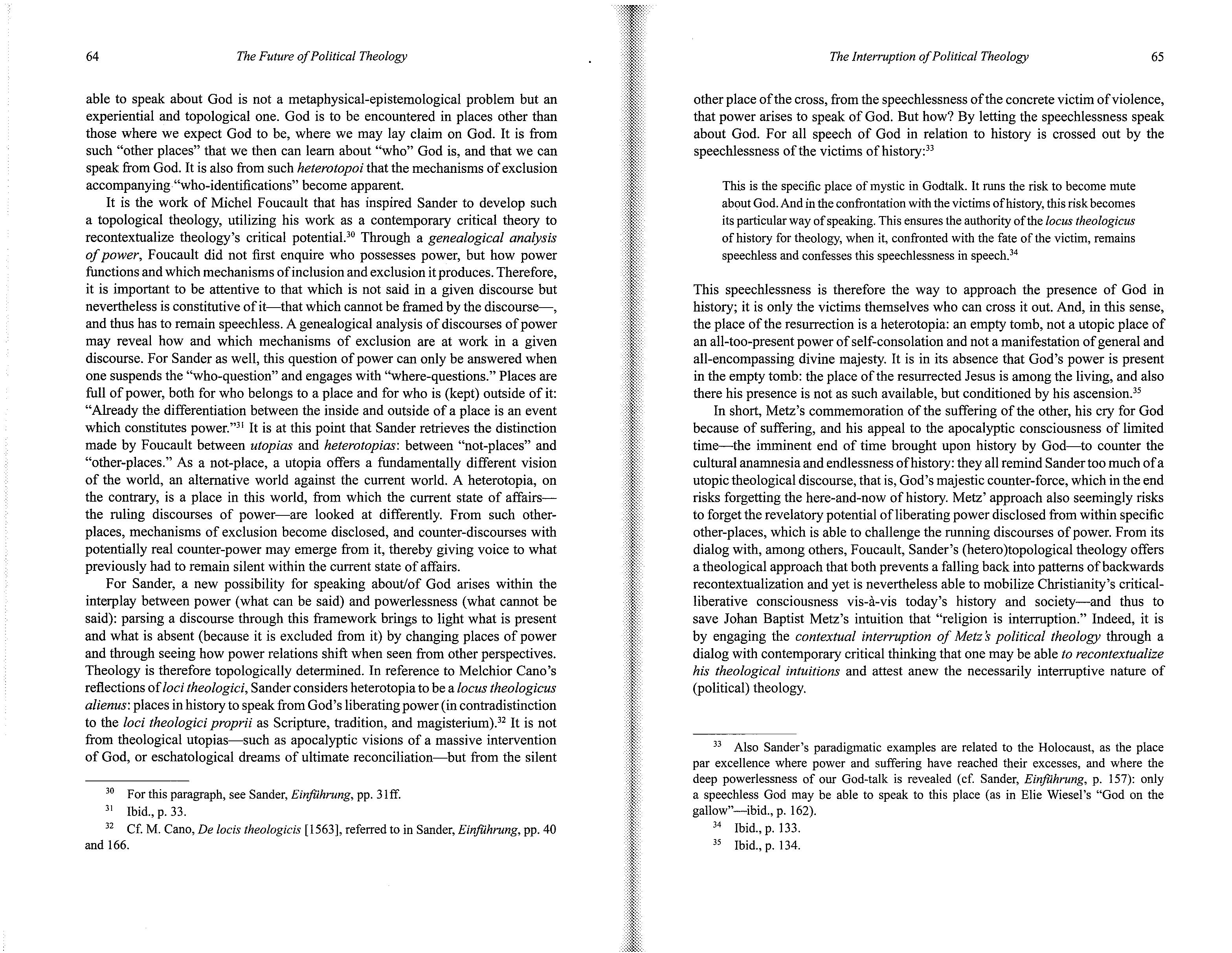
33 Also Sander's paradigmatic examples are related to the Holocaust, as the place par excellence where power and suffering have reached their excesses, and where the deep powerlessness of our God-talk is revealed (cf. Sander, Einfohrung, p. 157): only a speechless God may be able to speak to this place (as in Elie Wiesel's "God on the gallow"-ibid., p. 162).
34 Ibid., p. 133.
35 Ibid., p. 134.
64 The Future of Political Theology
The Interruption of Political Theology 65
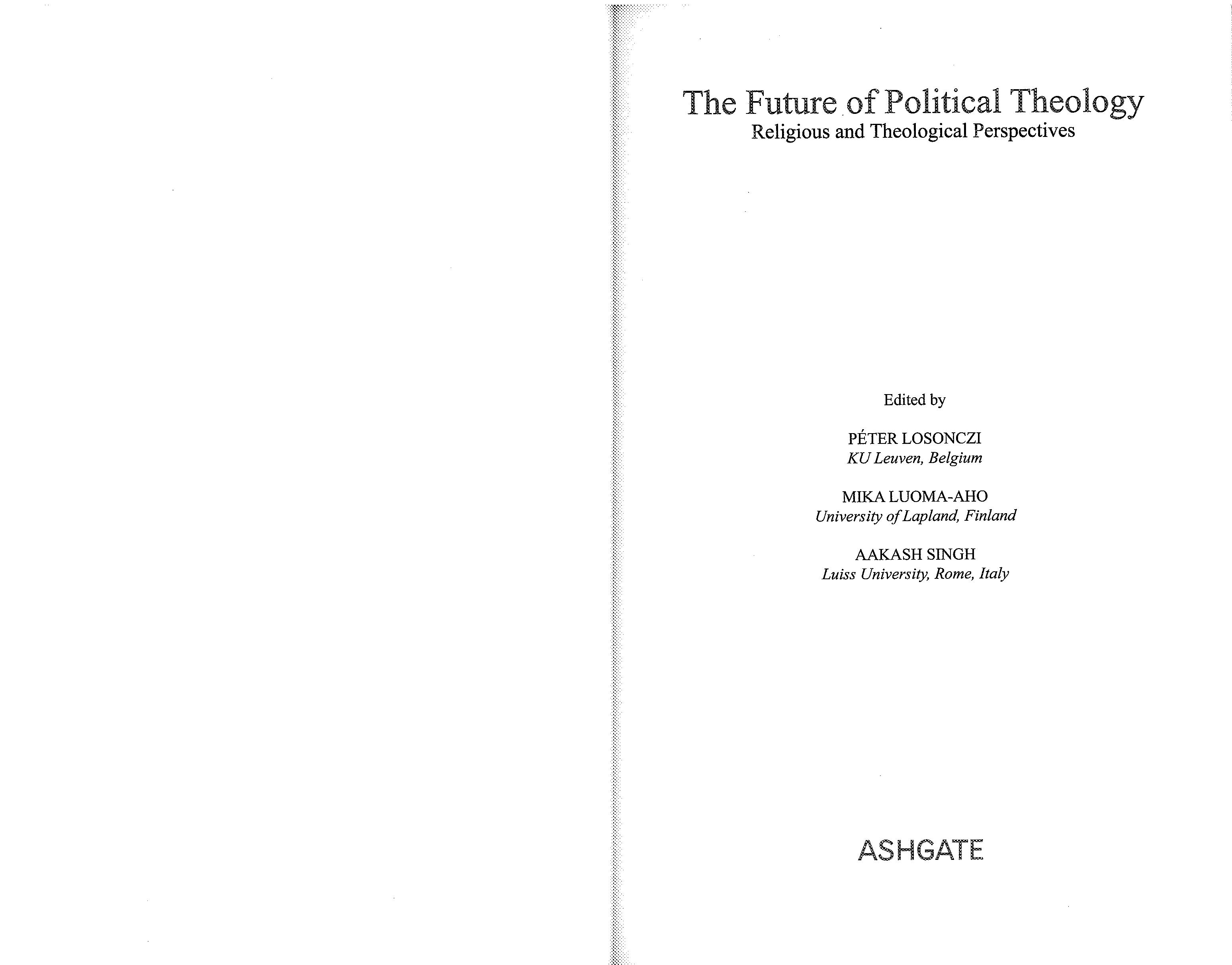 Edited by
PETER LOSONCZI
Edited by
PETER LOSONCZI







